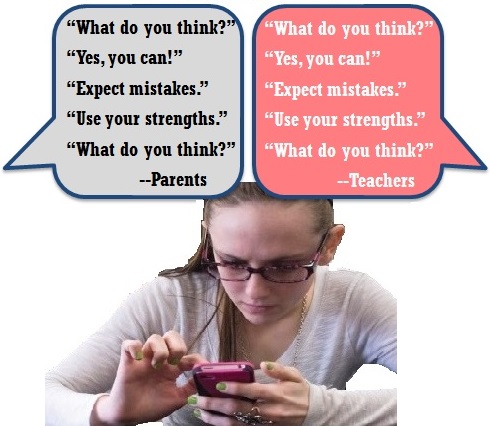5 Key Messages with Kids: So They Really Listen
December 14, 2016
Consistency matters. If we want our kids to learn, parents and teachers need to be delivering the same consistent, key messages with kids at home and at school. Why so important? Elementary school kids literally hear every word you say. And they generally want to please. But if they get conflicting messages, they can’t please everyone. They might stop trying. By middle school, however, we need to face the reality that tweens and teens don’t hear a lot of what adults say. It becomes even more essential to deliver simple, consistent key messages with kids so that when they tune in, the message sticks. 5 Key Messages with Kids What Do You Think? All too often, adults tell but forget to ask and listen. It’s amazing… Read More

Play Hard, Study Hard: What Cognitive Skills Tell Us
November 30, 2016
Research on cognitive skills gives powerful insight into what we should generally expect from children behaviorally, emotionally and academically at every age. Scientists from University of Pennsylvania’s Perelman School of Medicine Brain Behavior Lab evaluated nearly 10,000 children ages 8 to 21. They began with fMRI scans and then moved to an online assessment to analyze brain development at every age. Their data is fascinating. What We’ve Known About Cognitive Skills We’ve know for a long time that childhood is a period of rapid brain development. It is important that students shouldn’t be coasting and they shouldn’t be stretched too far beyond their comfort zone. In other words, they should be working in a state of “desirable difficulties” according to Dr. Robert A. Bjork. What’s News About Cognitive Skills from the Brain… Read More

35 Strategies for Teaching Growth Mindset
November 15, 2016
Teaching Growth Mindset Teaching growth mindset starts with modeling the mindset we want children to have. Children learn most by observing trusted adults. Educators know the power of growth mindset. It is having a positive attitude to our successes as well as our disappointments. Growth mindset enables us to succeed in the face of adversity. Fortunately, we know growth mindset can be taught. Even better is that it is never too late to develop a growth mindset. Using Growth Mindset Strategies Use the links below for the top strategies for teaching growth mindset. Consider starting with Respect and Validate Feelings. All teaching starts with a strong relationship. As you choose strategies, add them to your Mindprint Action Plan. Then gradually add additional strategies over time. Student-led strategies are best for middle school and above. Adult-led strategies… Read More

It’s All in the Details: A Strengths-Based Approach to Growth Mindset
September 14, 2016
By Nancy Weinstein I’m a big fan of Stanford professor Carol Dweck’s Growth Mindset. It’s hard not to be. It’s evidence-based research that is encouraging. Carol Dweck’s research demonstrates that if a student tries hard and believes he can succeed he is very likely to be successful. That simple. And the converse is true too. If you don’t believe in yourself that is likely to be self-fulfilling, regardless of your capabilities. Adults Play an Important Role in Growth Mindset Adults have HUGE influence in helping kids develop a growth mindset. Better still, it’s NEVER TOO LATE to develop a growth mindset. Not surprisingly, schools are eagerly embracing Carol Dweck’s lessons of growth mindset. They are doing everything from measuring it with questionnaires, teaching it as… Read More
Does Your Child Believe You? 5 Pre-requisites for Cultivating a Growth Mindset
March 10, 2016
By Mindprint Staff If you work with children or have children, you are probably aware of Carol Dweck‘s seminal work on the importance of growth mindset. In a nutshell, it’s a belief that your capabilities are not something you are simply born with but which you can develop with effort and commitment. Adults can have a big impact by focusing on a child’s effort not outcomes, and help kids understand that hard work and practice – not pure innate talent – will enable them to succeed. Unfortunately, as can often happen when solid research hits the mainstream media, Dweck’s excellent work has been grossly over-simplified. It’s not as easy as replacing, “Look how smart you are!” with, “I’m so proud of how hard you worked!” and…. Voila, the next Albert Einstein. Or… Read More



